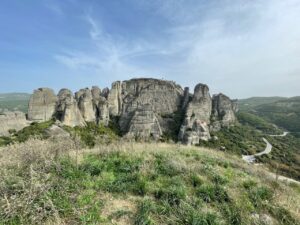Richard Francis Burton differs from our previous legends, in that he was born almost 200 years ago. Nevertheless, he remains relevant today. A salty character, “ill-fitted to run in official harness,” as one obituary put it, he appeals more to modern people than he did to his straight-laced contemporaries. Furthermore, his career highlights, like few others, the differences between a traveler and an explorer.
Burton was one of the great figures of the Victorian era, a time when Britain ruled not only the waves but much of the world. Multi-talented people were not in short supply, and Burton fit that mold, if few others. He was an artist, a writer, a swordsman and an inveterate and omni-curious traveler who was interested in anthropology, geology, theology and many other -ologies. He also spoke 29 languages, many of them so well that he could pass as a native. He once claimed that he could “break the back” of a language in six weeks.

Stationed with the British army in India, he preferred to go out disguised as a local to hanging around with his fellow officers. His linguistic abilities and love of masquerade prompted his first major journey. In the guise of a Pashtun merchant, he joined a pilgrimage to Mecca and Medina. Unbelievers were not allowed, under pain of death, to enter these sacred Islamic cities, but Burton brought off the ruse. He was not the first Westerner to penetrate Mecca, but he was the most observant and articulate. His two-volume book on the adventure made him famous. He was in his early thirties.

For the next six years, beginning in the early 1850s, he explored Africa. He was the first European to reach Harar, another forbidden city, now in Ethiopia. A young British officer with an interest in exploration named John Hanning Speke signed on with Burton as a junior partner. In Somalia, the two of them were attacked in their tent by about 200 warriors. They fled, fighting for their lives, Burton with a spear hanging from his jaw, Speke with a dozen wounds. The ragged scar from that spear is visible in all later portraits and makes his craggy face look even harsher.

Burton and Speke continued their explorations during a second journey. They wanted to investigate rumours of huge lakes in the African interior. The source of the Nile was the great geographical mystery of the time. The person who discovered it would immediately become one of the great explorers of the 19th century.
They made a good start when they became the first Westerners to see Lake Tanganyika, although Speke, ailing from an eye infection, did not see much of anything. Burton also suffered from such serious tropical diseases that he later wrote how Death “came around our sleeping mats — came and went.” While Burton convalesced and investigated the local culture, a somewhat recovered Speke went on a foray of his own. Fatefully, he discovered a giant inland sea that he called Lake Victoria. With a grasp of 19th-century pr, or perhaps just gifted insight, he declared that this had to be the source of the Nile.
Burton’s relationship with Speke had always been reserved but agreeable. Speke had clearly been an underling. He didn’t know any local languages, was a stodgy writer, a lesser man in most ways. But these limitations allowed him not to be pulled in a thousand directions, as Burton was by his curiosity. This was Speke’s main chance to distinguish himself, and he seized it. Burton may easily have blundered onto Lake Victoria himself, but he was just as interested in sussing out odd customs, sketching villagers, mastering another dialect or amassing footnotes about the sexual practices of the people in that region as he was in a purely geographical find.
Speke returned to Britain slightly before Burton, and — depending on how it’s framed — seized credit or was given credit for arguably the greatest geographical discovery of the century. When Burton arrived, he found himself overshadowed by the buzz around Lake Victoria. Although he vehemently disagreed with Speke’s assessment and argued why Lake Victoria could not be the source of the Nile, he was wrong: It was.
Until now, Burton had been primarily an explorer, although his pilgrimage to Mecca was perhaps more of a Boy’s Own adventure. But from this point on, he became strictly a traveler. Sometimes independently, sometimes using a consular appointment as a springboard to new places, he dashed around the world — to Paraguay, Brazil, Iceland, Syria, the western United States, India, West Africa. From each of these experiences, he produced a two-volume travel tome that was both prodigiously erudite and incredibly dull, despite the flashes of brilliance and hilarity when he sounds off about some person or perceived outrage.
By contemporary standards, Burton was a highly prejudiced observer. Although he was hardly one of those so content with his own culture that he could not appreciate others, he did not rise above the bigotry of the age. He didn’t like Africans very much; he admired Arabs, though he referred to them as “jet-bearded, fierce-eyed henhearts.” If you can turn a blind eye to his political incorrectness, then Burton’s writing exults in the comic power of Victorian English. The crap which fills most of his tomes is worth wading through for the glittering one-liners, offbeat literary quotes, invented words, quaint phrases and withering gibes:
About a village hut: “The floor was like the ground outside, only not nearly so clean.”
About Amazon-style female warriors in Africa: “I was looking forward with prodigious curiosity to see 5,000 African adult virgins, never yet having met with a single specimen…They maneuver with the precision of a flock of sheep…An equal number of British charwomen, armed with the British broomstick, would…clear them off in a very few hours.”
About an American homesteader: “Her nose was ‘pugged’, apparently by gnawing hard potatoes before that member had acquired firmness and consistency. Her hair, and, indeed, her general costume looked…as though she had been rammed through a bush fence into a world of wretchedness and woe.”
Burton could stoically endure much, but you mildly inconvenienced him at your peril. One African king judged Burton, “a good man, but too angry.”
Many of Burton’s travel books suffered from haste. Typically, he had a couple of months to dash off 800 pages before his next adventure. He was in desperate need of a good editor. One particularly boring section of a book bored even Burton. He finished it abruptly with, “I now conclude this unpopular chapter.” One wonders why he didn’t just cut it out.
Not all Burton’s writing was slapdash. His early travel books were comparatively well-honed. Some of his literary translations were exquisite, especially his 16-volume rendition of the Thousand Nights and a Night. Not only did he present these Arabian nights tales in tight and lively prose, proving that he could do it, but the volumes are peppered with hundreds of his own extended footnotes that are sometimes more interesting than the story itself.
His version of the Nights was problematic for that era, however, because the original contains many racy passages. Burton — who loved to shock — never flinched from translating every detail; in fact, he often elaborated on them in the footnotes. His most infamous footnote, presented as an appendix, was the 18,000-word Terminal Essay on sodomy in the Middle East. Little wonder that in Victorian England, the translation had to be privately printed by a secret society that he had co-founded.
It’s not known whether Burton explored these practices personally or was just as intellectually curious about sex as he seemed to be about everything else. Although he admitted that, despite his love of erotica, “I am no hot amorist,” he did marry eventually. His wife, Isabel, was a tough woman who waited patiently for years for this always-away, pseudo-suitor to come round.
As he drifted from consular post to post in his later years, she accompanied him energetically. When Burton died, she burned many of his unpublished writings, including a translation of another classic erotic text, in an attempt to recast this rakish man, with “the brow of a god and the jaw of a devil,” as a good Christian husband.







